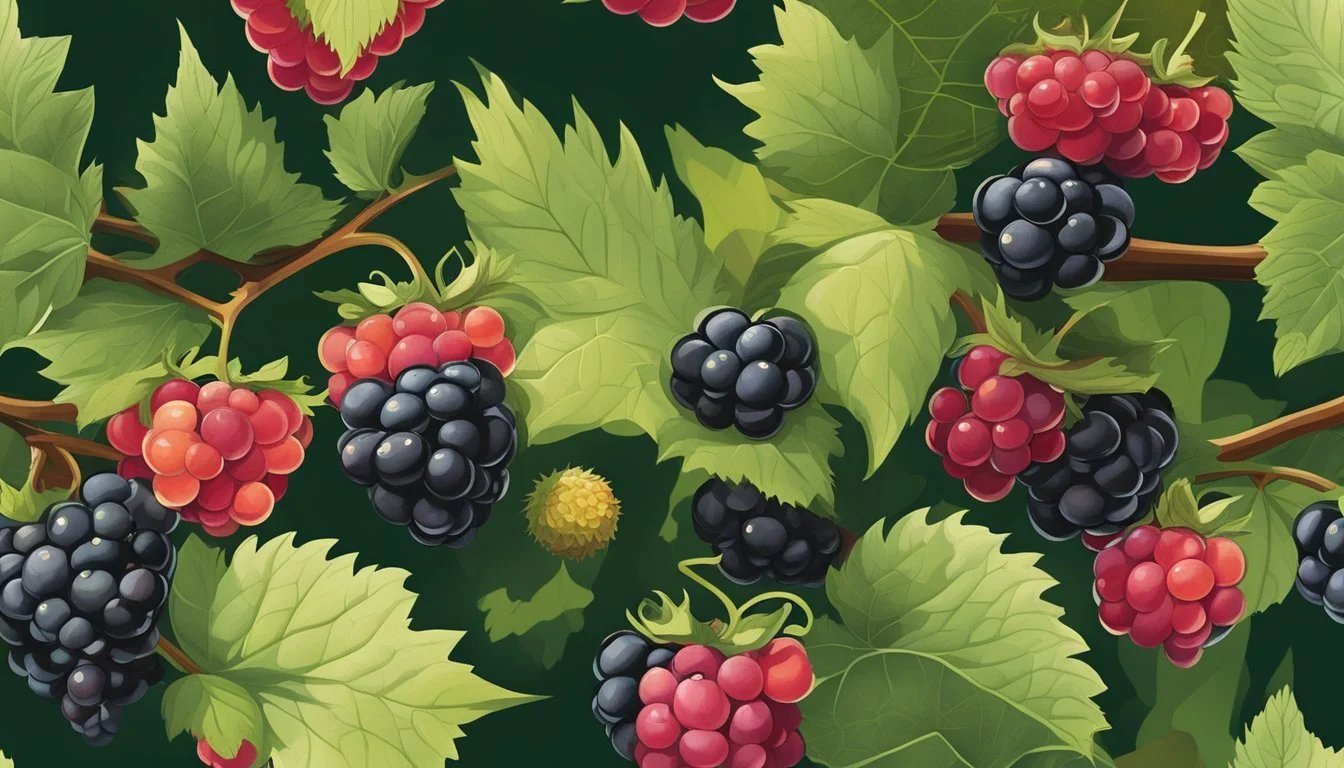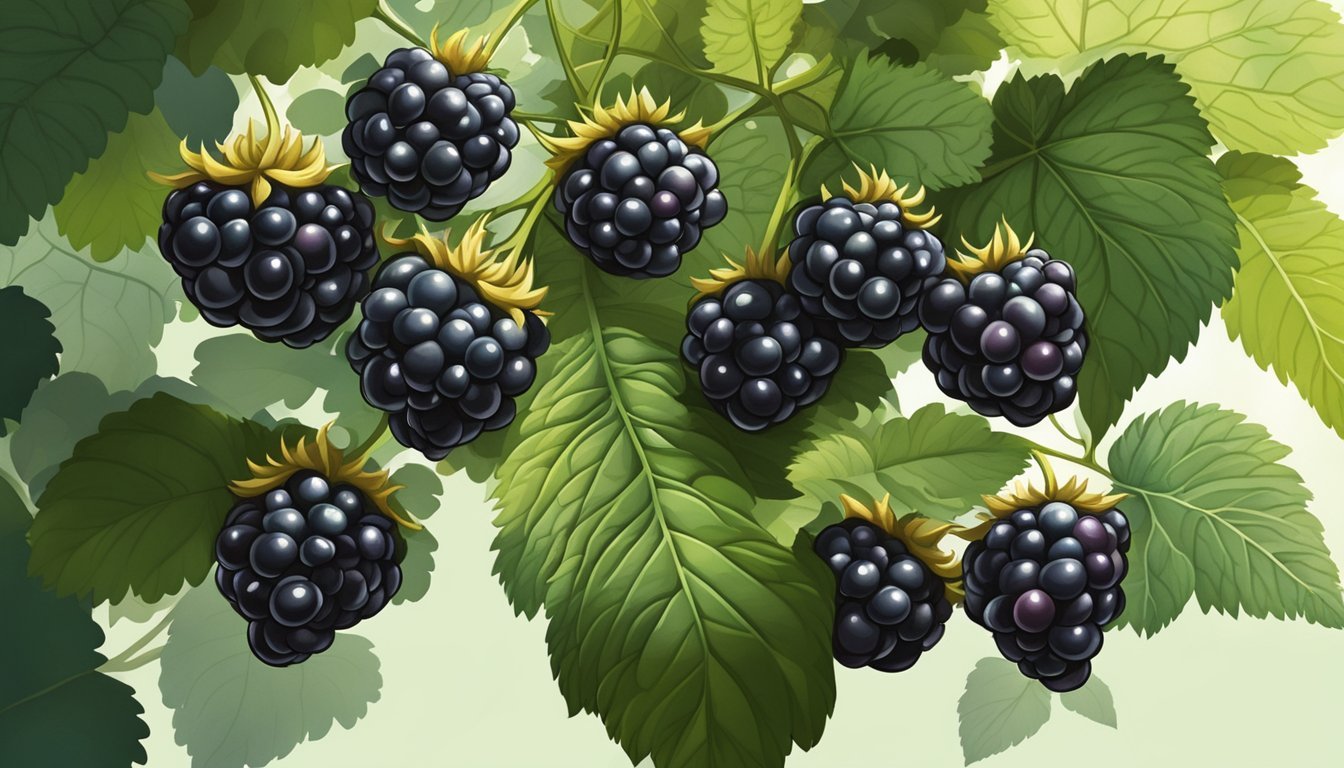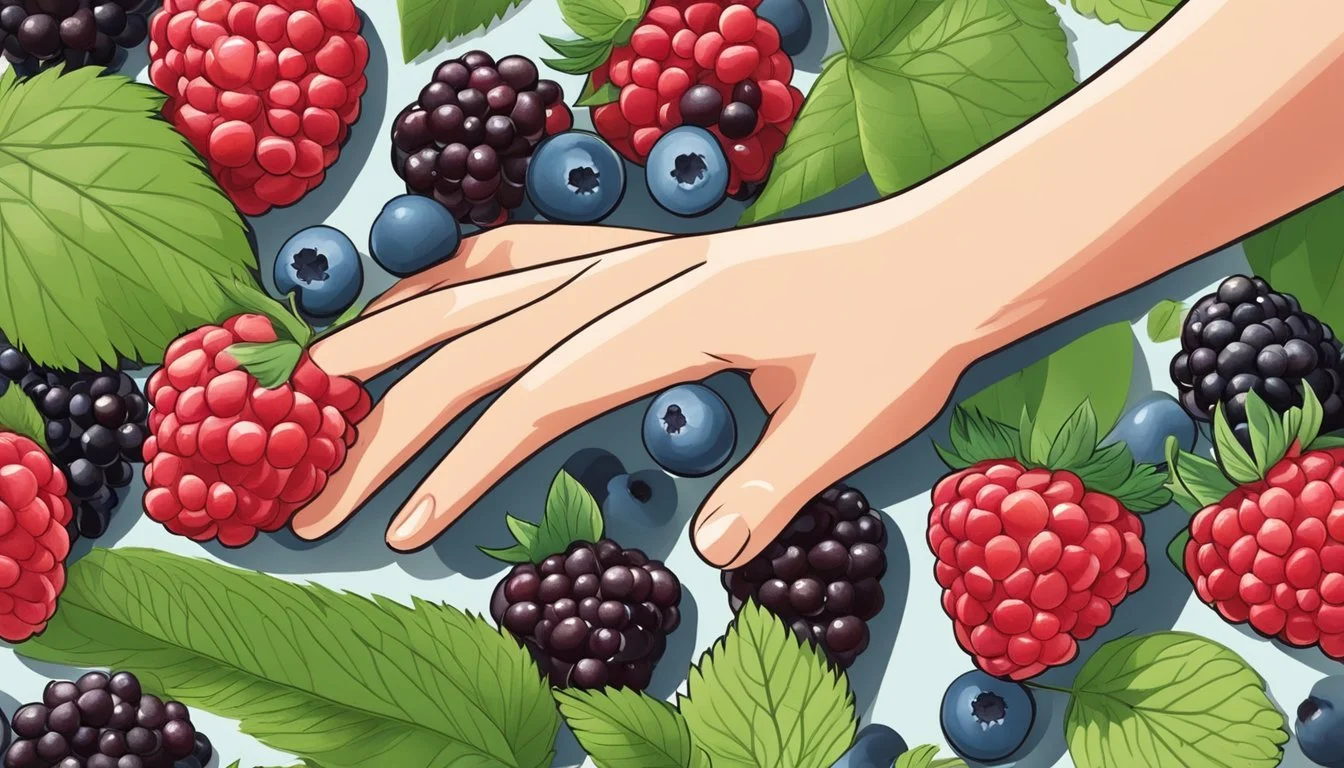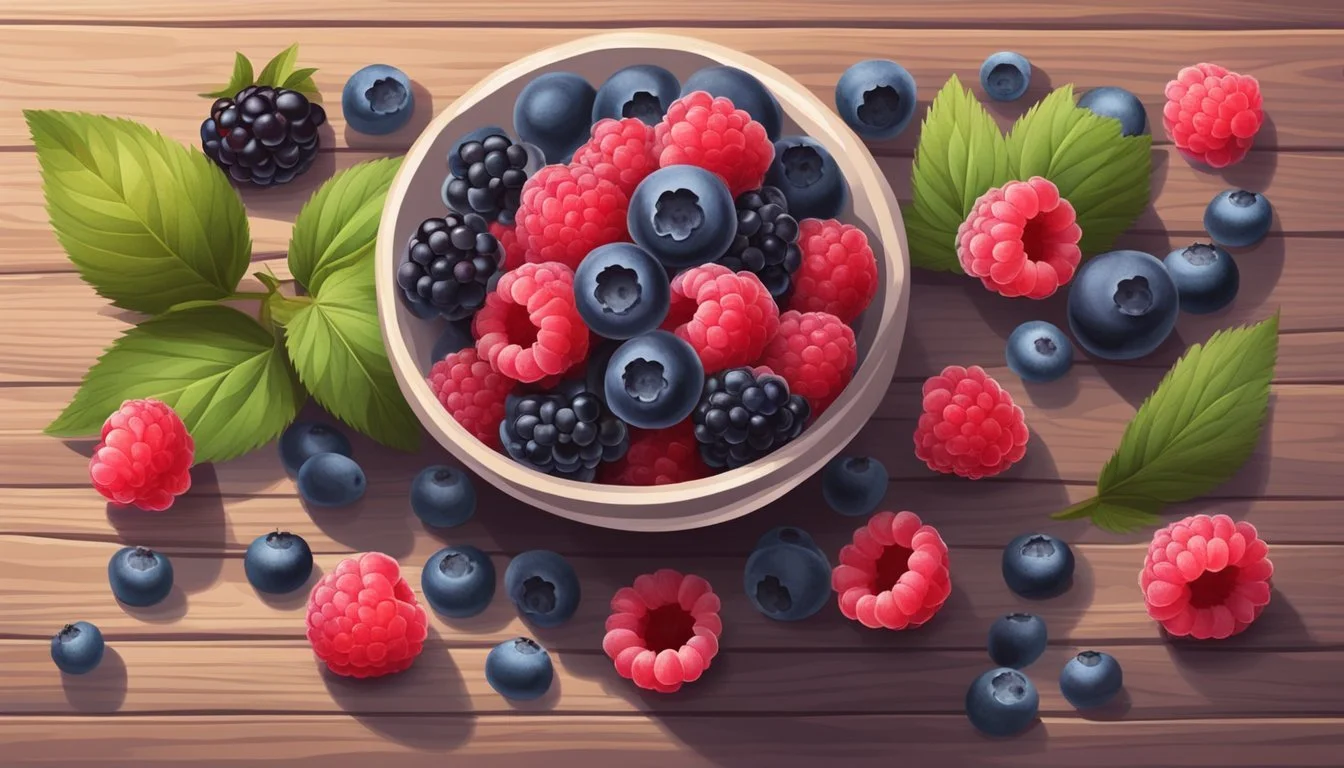Blackberries Substitutes
Top Alternatives for Your Recipes
Blackberries are highly regarded as a nutritious superfood, brimming with antioxidants that support overall health. They are distinguished by their deep purple-black hue and delicate structure, offering a unique combination of tart and sweet flavors that make them popular in a variety of culinary dishes. However, blackberries may not always be available or suitable for every diet, leading individuals to seek out viable substitutes that can closely mimic their characteristics in both cooking and baking.
Among the alternatives, mulberries are often recommended due to their similar texture and nutritional profile, which includes high levels of vitamin C and iron. They can be used interchangeably with blackberries in various recipes without compromising the taste or health benefits. Other berries, such as red raspberries and black raspberries, also make for favorable substitutes thanks to their comparable flavor profiles and nutritional content. Raspberries are relatives to blackberries, sharing the same genus, which accounts for the similarities in taste and appearance.
Understanding Blackberries
Blackberries are a nutritious and versatile type of fruit known for their distinctive flavor and appearance. They are a popular choice in various culinary applications due to their unique characteristics.
Nutritional Profile
Blackberries are known for their rich nutritional content. They are high in vitamins, fiber, and antioxidants. Specifically, they are an excellent source of vitamin C and manganese and provide a good amount of vitamins A, E, and K. These berries also contain minerals such as magnesium, potassium, iron, and are considered low in calories.
Vitamin C: Essential for the immune system and skin health.
Fiber: Aids in digestion and contributes to a feeling of fullness.
Manganese: Supports bone development and the body's ability to convert nutrients into energy.
Culinary Uses
In the culinary world, blackberries are a versatile ingredient. They can be used fresh or in cooked preparations, adding flavor and texture to an assortment of dishes. They are popular in baking, as well as in the making of jams, sauces, and pies. Blackberries can also enhance the taste and appearance of salads and smoothies.
Baking: Perfect for adding to pies and pastries.
Jams: Blackberries yield a richly flavored and colored preserve.
Salads: Fresh blackberries can brighten up any salad with their color and flavor.
Physical Characteristics
The physical characteristics of blackberries are notable. They have a deep purple hue, indicating ripeness and are made up of multiple small seeds contained in soft, plump drupelets. Their texture is somewhat delicate, and they are usually about the size of the tip of a thumb.
Color: Typically deep purple to almost black when ripe.
Size: Small, each berry is comprised of individual drupelets clumped together.
Texture: Soft and delicate; must be handled with care to avoid crushing.
Flavor Profile
The flavor profile of blackberries is complex, typically a balance of tart and sweet. While they can be more tart when underripe, as they mature, their sweetness intensifies. Blackberries possess a different flavor from other berries, making them distinctive in dishes where their flavor can both complement and enhance the overall taste.
Raw: Can be tart, sweetening as they ripen.
Cooked: Develops a richer flavor, often paired with sugar to balance the tartness.
Selecting Blackberry Substitutes
When choosing substitutes for blackberries, one must consider factors like taste and texture alignment while ensuring availability and nutritional parallels. This strategic selection empowers one to maintain the integrity of dishes where blackberries play a pivotal role.
Factors to Consider
Before selecting a blackberry substitute, it's crucial to assess taste and texture. Ideally, the replacement should emulate the unique tartness and softness of blackberries. One should also consider the size of the berries to keep proportions consistent. Moreover, availability can play a role; hence, localized fruits can serve as convenient substitutes. Lastly, for health-conscious individuals, maintaining a similar nutritional value is important.
Common Alternatives
Raspberries: Similar in texture and tart with a slight increase in sweetness; widely available.
Blueberries: Slightly less tart but provide a similar burst of flavor and juiciness; common in various climates.
Strawberries: Bigger in size, yet can be cut to size, offering a sweet with mild tartness alternative; easily found year-round.
Less Common Varieties
Huckleberries: Resemble blackberries in taste and appearance but are often not as readily available.
Elderberries: Offer a similar tartness but are smaller in size and have a more earthy flavor; often found in health stores or as a foraged item.
Gooseberries: Provide a unique, tangy taste with a similar texture; seasonally accessible in some regions.
Exotic Options
When looking for an unconventional twist or when common berries are not available, one might consider these exotic fruits:
Acai berries: Dense in nutritional value with a characteristic tartness; frequently sold in frozen puree form.
Pomegranate seeds: Tart and crunchy, adding a different textural component; recognized for their health benefits.
Passion fruit: Possesses a tropical, tangy flavor and can be used in sauces or glazes to imitate blackberry's acidity.
By carefully evaluating these alternatives, one can adeptly substitute blackberries, preserving the essence of the original recipe while introducing new flavors and experiences.
Blackberry Substitutes in Recipes
When blackberries are not available or one is looking for a variation in taste and texture, there are several alternative fruits that can be used in different types of recipes.
Baking Alternatives
For baked goods such as muffins and cobblers, blueberries are an excellent substitute for blackberries. They possess a similar texture and can be used in either fresh or frozen form to maintain the structure and moisture level of desserts. When replacing blackberries in recipes like cobbler, adjustments in sweeteners may be required due to blueberries' mildly different sweetness profile.
Mulberries, albeit less common, are another substitute. They have a sweeter, milder flavor and can work well in baked goods. Since they are more delicate, one might need to gently fold them into batters to avoid crushing.
For Fresh Consumptions
In fresh applications such as salads or as a topping for yogurt and granola, a mixture of berries can work in place of blackberries to provide a vibrant burst of flavor and nutrition. Raspberries offer a similar aesthetic and textural experience, while strawberries, cut into smaller pieces, can give a satisfying, juicy substitute in snacks and fresh consumption.
Sauces and Jams
While crafting sauces, jams, and jellies, the substitution largely depends on the desired flavor profile. For a taste similar to blackberry jelly, one could opt for blueberries, which can also be used in syrups due to their robust, fruity essence. On the other hand, cherries provide a deeper, more tart flavor and can be a delightful alternative in sauces and puddings.
Beverage Enhancements
Adding berries to beverages like smoothies and juices can enhance both their nutritive value and taste. When blackberries are not an option, blueberries become a versatile ingredient for a wide range of drinks. Their subtle sweetness and vivid color make them perfect for both smoothies and tailor-made juices. For a slight twist, incorporating mixed berries presents a complex flavor bouquet that can elevate the sensory experience of any drink.
Health Considerations
Choosing a substitute for blackberries in a diet involves considering the nutritional changes, particularly in terms of antioxidant content and dietary fiber benefits.
Antioxidant Content
Blackberries are known for their high antioxidant levels, specifically anthocyanins, which are responsible for their deep purple hue. These compounds are linked with numerous health benefits, including reduced inflammation and protection against heart disease. When substituting blackberries, it's essential to opt for berries like blueberries or mulberries that have similar or greater antioxidant levels to maintain these benefits.
Dietary Fiber Benefits
A single cup of blackberries contains approximately 7.6 grams of fiber. This is a substantial contribution to the recommended daily intake, which is 25 to 40 grams depending on one's age and sex. Fiber is crucial for maintaining regular bowel movements and can help to control blood sugar levels. When selecting an alternative, one should consider fruits that are also high in fiber to ensure these digestive and glycemic advantages are preserved. For example, mulberries provide a good amount of fiber and can be a suitable substitute in this regard.
Preservation and Storage
Preservation techniques are crucial for maintaining the freshness and extending the shelf life of perishable fruits like blackberries and their substitutes. Proper storage methods can ensure that these delicate items are available year-round, whether purchased from grocery stores or harvested at peak season.
Handling Perishable Fruits
When dealing with perishable blackberries and similar fruits, immediate and proper handling after purchasing or picking is key. They should be stored at a cool temperature soon after acquisition to maintain their quality. For short-term storage:
Refrigeration: Store blackberries in the refrigerator in a single layer, preferably on a paper towel to absorb any excess moisture. They should not be washed until right before use to prevent mold growth.
Vinegar Solution: To extend freshness, berries can be rinsed in a 3:1 water to vinegar solution, which helps to kill bacteria and remove pesticide residue.
For long-term storage options:
Freezing: Blackberries can be frozen to preserve their quality. They should be spread on a baking sheet to flash freeze, and then transferred to a freezer-safe container to avoid clumping. Properly frozen, they can last up to six months.
Drying: Another effective method for long-term storage is drying the blackberries. They can be dehydrated in a food dehydrator or a low-temperature oven until they're shriveled and moisture-free.
Storing Substitutes
Substitutes for fresh blackberries, such as frozen or dried varieties, offer versatility and convenience. They require different storage methods:
Frozen Substitutes: These should be kept in the freezer and can be used as a straight swap for fresh in recipes. To prevent freezer burn, they should be stored in airtight containers or bags.
Dried Substitutes: Dried blackberries need to be stored in a cool, dry, and dark place to ensure they remain free from moisture that can lead to spoilage. An airtight container is ideal for this purpose.
By adhering to these preservation and storage methods, one can enjoy the taste and nutritional benefits of blackberries and their substitutes throughout the year.
Conclusion
When considering alternatives to blackberries in culinary applications, mulberries can be an acceptable replacement. Mulberries have a sweeter, more mild flavor profile, often described as slightly floral. They contrast the bold, intense taste of blackberries, which are known for their tartness. One should be mindful of these taste differences when substituting in recipes that traditionally use blackberries, as it can slightly alter the flavor balance of the dish.
Berry Type Flavor Profile Texture Use in Recipes Blackberry Intense, Tart Juicy, Firm Desserts, Jams, Sauces Mulberry Sweet, Mild, Floral Softer Desserts, Jams, Sauces (with adjusted sugar)
In terms of nutrition, mulberries are comparable to blackberries but have a distinct shape and may offer a different array of nutrients. Cooks should consider this when aiming for specific nutritional goals or when cooking for individuals with dietary restrictions.
Ultimately, the choice to use mulberries in place of blackberries will depend on the desired outcome in flavor, texture, and aesthetic appeal of the dish. A subtle shift in the dish's sweetness could be beneficial, depending on personal preference and the complementary flavors involved.
Bakers and chefs are encouraged to use their judgment in the kitchen and experiment with different berries to suit the taste of their audience. It's this creativity and adaptability that enrich the culinary experience.






